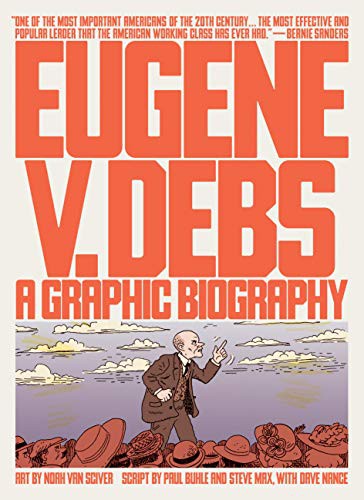Literally Graphic reviewed Eugene V. Debs by Paul Buhle
Review of 'Eugene V. Debs' on 'Goodreads'
2 stars
Finding out that this book was written by three people does make me feel slightly better about the fact that I didn't really feel like the personality of the author came through - which I do prefer in my nonfiction as I feel like I get a better idea of the biases they are bringing to bear on the subject. That said, I still don't like it. Not only am I left feeling unsure about what is (for example) being left out or brushed over, and I feel like having more writer personality would have made the book at least a little bit more interesting. Very Democratic Socialists of America centrist, I do wonder what a IWW perspective on one of its founding members would be.
As far as the more technical side of the volume. I have to admit that this volume does a lot of things right where previous leftist nonfiction books have tripped up. The essays were done in a book font, not a comic font, and the lines are broken into two columns. Maybe a bit extreme, but better then another book (that I don't remember the title of right now) that had super long lines that were hard to read in the proper order. And while I didn't think that the essays were terribly engaging but I didn't feel like I was being beaten over the head with condensation.
As far as gender and sexuality are involved, while queer people have always existed, their inclusion was probably the least offensive over site. There is some inclusion of the ways white women's suffrage related to the overall socialist movement in America.
As far as race is concerned, nearing the end of the book I was wondering if the only obviously Black people would be random characters in prison but then there's 2 frames of MLK and company a few more random black background characters, and another frame of of John Lewis and Cornel West. With one small frame that looks like sleeping Guatemalans but they are probably dead because it's next to dialog admitting that Norman Thomas was mistaken to support the CIA overthrowing of that country. Going back to the beginning I was relieved to see that there is a frame at least dedicated to A Philip Randolph and W.E.B. DeBois. That said, this is not enough!
While I feel like women's suffrage probably did't get that much more room, if any, having it concentrated into one part with clear connections between the movement outlined left me feeling like white women were prioritized above Black men. Let alone the complete lack of Black women! The representation is so scattered and highlighted such obvious choices. This total oversight certainly played a big role in my final rating for this book.
Flipping through all the other reviews on goodreads I was not surprised that many people did enjoy this, but I was reassured by a couple of other people thinking it's too scattered. I don't have top notch reading comprehension so I was thinking maybe it was just a me thing. Definitely more of an overview of the strictly socialist party's history in america, there's too much GREAT MEN OF HISTORY going on in this book for me to be very comfortable at all. Writing up this review, I am constantly being reminded of how much better "Ginger Goodwin: A Worker's Friend" by Laura Ellyn. Which felt like it was more about "common" people.
Moving on to how class was treated in the book, while Eugene certainly came from more humble means and gave away much of what he had I still felt like this book lost its way. Circling back to the great men of history way things were presented, the way this creates hierarchy detracts from any working class representation. Kind of like the "I'm not like other girls" trope if that make sense?
Ability vs disability wasn't very represented. I guess it did hit the very low bar of showing people age and getting sick at different points in their life. I still think it's important to realistically depict the toll that being so politically active can have on a person but still not sure if it counts to much.

